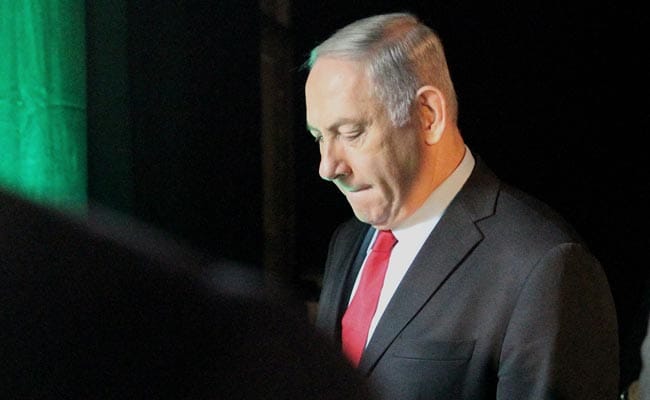
Israel Prime Minister Benjamin Netanyahu denies any wrongdoing in all the cases
JERUSALEM:
Israeli police questioned Prime Minister Benjamin Netanyahu on Friday for the first time in a corruption case that involves the country's largest telecommunications company Bezeq, Israel Radio said.
Along with two other corruption cases, in which Netanyahu is suspected of bribery, the probes pose a serious threat to the four-term prime minister's political survival.
Netanyahu denies any wrongdoing in all the cases.
In the newest investigation, known as Case 4000, police allege that the owners of Bezeq Israel Telecom provided favourable coverage of Netanyahu and his wife on a news website they controlled in return for favours from communications regulators.
A police spokesman declined comment. A Reuters cameraman saw a vehicle carrying two police officers pull into the prime minister's official residence on Friday morning.
Israel Radio said Netanyahu's wife Sara was providing testimony at the same time, at a police station near Tel Aviv.
The controlling shareholder of Bezeq Telecom, Shaul Elovitch, is currently in police custody, along with a former Netanyahu spokesman. They deny any wrongdoing.
Shlomo Filber, a confidant of Netanyahu and former director general of the Communications Ministry, has also been arrested in connection with the case, and has agreed to turn state's witness, according to Israeli media.
Netanyahu, Israel's dominant political figure for a generation - in power since 2009 and for 12 years in total since 1996 - calls the allegations against him a "witch hunt". He has said he will seek a fifth term in a national election due in late 2019.
Police recommended in February that Netanyahu be indicted in two other corruption investigations. The attorney-general must determine whether to accept the police recommendation to charge him. The final decision on both cases could take months.
In one, known as Case 1000, he is suspected of bribery over gifts, which police say were worth nearly $300,000, that he received from wealthy businessmen.
The other, Case 2000, involves an alleged plot to win positive coverage in Israel's biggest newspaper by offering to take measures to curtail the circulation of a rival daily.
So far, partners in Netanyahu's governing coalition have stood by him, saying they were awaiting the attorney-general's next moves. Political analysts say that could change if the investigations against Netanyahu intensify.
Netanyahu could also call a snap election to try to stall legal proceedings during the campaign and rally his right-wing power base behind him.
(Except for the headline, this story has not been edited by NDTV staff and is published from a syndicated feed.)
Along with two other corruption cases, in which Netanyahu is suspected of bribery, the probes pose a serious threat to the four-term prime minister's political survival.
Netanyahu denies any wrongdoing in all the cases.
In the newest investigation, known as Case 4000, police allege that the owners of Bezeq Israel Telecom provided favourable coverage of Netanyahu and his wife on a news website they controlled in return for favours from communications regulators.
A police spokesman declined comment. A Reuters cameraman saw a vehicle carrying two police officers pull into the prime minister's official residence on Friday morning.
Israel Radio said Netanyahu's wife Sara was providing testimony at the same time, at a police station near Tel Aviv.
The controlling shareholder of Bezeq Telecom, Shaul Elovitch, is currently in police custody, along with a former Netanyahu spokesman. They deny any wrongdoing.
Shlomo Filber, a confidant of Netanyahu and former director general of the Communications Ministry, has also been arrested in connection with the case, and has agreed to turn state's witness, according to Israeli media.
Netanyahu, Israel's dominant political figure for a generation - in power since 2009 and for 12 years in total since 1996 - calls the allegations against him a "witch hunt". He has said he will seek a fifth term in a national election due in late 2019.
Police recommended in February that Netanyahu be indicted in two other corruption investigations. The attorney-general must determine whether to accept the police recommendation to charge him. The final decision on both cases could take months.
In one, known as Case 1000, he is suspected of bribery over gifts, which police say were worth nearly $300,000, that he received from wealthy businessmen.
The other, Case 2000, involves an alleged plot to win positive coverage in Israel's biggest newspaper by offering to take measures to curtail the circulation of a rival daily.
So far, partners in Netanyahu's governing coalition have stood by him, saying they were awaiting the attorney-general's next moves. Political analysts say that could change if the investigations against Netanyahu intensify.
Netanyahu could also call a snap election to try to stall legal proceedings during the campaign and rally his right-wing power base behind him.
© Thomson Reuters 2018
(Except for the headline, this story has not been edited by NDTV staff and is published from a syndicated feed.)
Track Latest News Live on NDTV.com and get news updates from India and around the world

